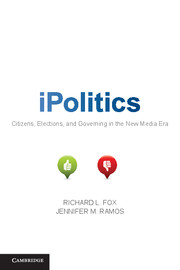Book contents
- Frontmatter
- Contents
- List of Tables and Figures
- Contributors
- Preface and Acknowledgments
- Introduction
- Section I The Shifting Media Universe and News Consumers
- Section II Campaigns and Elections in the New Media Environment
- 4 YouTube and TV Advertising Campaigns
- 5 The Rise of Web Campaigning in Finland
- 6 E-Campaigns in Old Europe
- Section III Civic Mobilization and Governance in the New Information Age
- Index
- References
5 - The Rise of Web Campaigning in Finland
from Section II - Campaigns and Elections in the New Media Environment
Published online by Cambridge University Press: 05 June 2012
- Frontmatter
- Contents
- List of Tables and Figures
- Contributors
- Preface and Acknowledgments
- Introduction
- Section I The Shifting Media Universe and News Consumers
- Section II Campaigns and Elections in the New Media Environment
- 4 YouTube and TV Advertising Campaigns
- 5 The Rise of Web Campaigning in Finland
- 6 E-Campaigns in Old Europe
- Section III Civic Mobilization and Governance in the New Information Age
- Index
- References
Summary
In May 2009, about a month before the Finnish elections for the European Parliament, Taru Tujunen, party secretary for the Finnish National Coalition Party, stated, “During each election, I believe that I have proclaimed that this is the first Internet election” (Verkkouutiset 2009). Tujunen was certainly being ironic in discussing her party's Web campaigning strategies, but her comment highlighted that the party (a major player in Finnish modern elections) has, for each recent election, gradually advanced in its use of the Internet as a campaign tool. According to Tujunen, campaigns must be present where the voters are today – online. Thus the days of traditional campaign meetings, in which candidates representing the party and voters met locally and interacted directly, were coming to an end: This form of campaigning is – and here she used a Finnish metaphor – “snow from last year's winter” (Verkkouutiset 2009).
Indeed, scholars examining changes in election campaigning practices across time in Europe have usually stressed the role of the advances in communication technology (e.g., Norris 2000a). In the premodern era of campaigning, direct interpersonal communications (e.g., campaign meetings) and print media (party press, pamphlets) were central. In the modern campaign era, the television developed into the most important forum of campaign events. In the emerging postmodern campaign era, the Internet is playing a key role. Interestingly, and in contrast to the Finnish party secretary's dismissal of old types of campaigning, scholars have noted that Web campaigning in two respects represents a return to the premodern campaign era (Norris 2000a: 149; Ward and Gibson 2003: 189–90). First, the Web has the potential to again decentralize campaigning. Whereas television in many European countries facilitated the development of centralized campaigns organized by strong party organizations, the Web offers a reasonably cheap and functional platform for campaigning that strengthens individual candidates and their campaigns at local levels (Zittel 2009). Second, because new media allow different forms of interactivity, there might be a revival of interpersonal communication between campaigns and voters. In developing various interactive practices that facilitate contact and thereby engage voters, Web campaigns by candidates may play a more important role than online centralized party campaigns (Gibson 2004; Greer and LaPointe 2003; Zittel 2009).
- Type
- Chapter
- Information
- iPoliticsCitizens, Elections, and Governing in the New Media Era, pp. 125 - 150Publisher: Cambridge University PressPrint publication year: 2011
References
- 2
- Cited by



